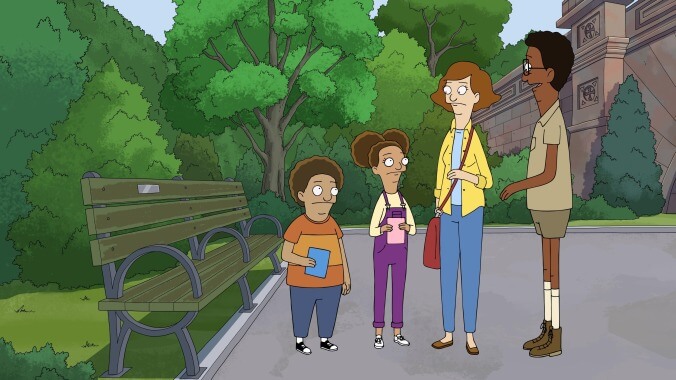Apple TV Plus’ Central Park is just as full of imagination and musical joy in season 2
The second season of the animated musical comedy is a mostly successful, heartwarming adventure

For most New Yorkers, Central Park offers an escape from, well, everything. The expansive green space in the middle of the city is a refuge from its Lego-like skyscrapers. However, in Apple TV+’s Central Park, the eponymous public garden and the rest of Big Apple have a reversed role in the lives of the Tillerman family. Owen Tillerman (Leslie Odom Jr.) is the polite and passionate park manager who resides on the grounds itself with his journalist wife Paige (Kathryn Hahn), their daughter Molly (The Umbrella Academy’s Emmy Raver-Lampman) and son Cole (Tituss Burgess). Co-created by Bob’s Burgers’ Loren Bouchard, along with Nora Smith and Josh Gad, Central Park might have a similar animation style, but it has its own fascinating and unique setting for a family comedy.
In season one, the Tillermans fought for their home as grumpy old heiress Bitsy Brandenham (Stanley Tucci) plotted to demolish Central Park to turn it into condominiums and shopping malls. The first half of season two takes a step back from this grand scheme to focus on character development. The new episodes challenge the protagonists’ intense obsessions as they were established in season one. For Owen, it’s the park, while for Paige, it’s breaking a big story. Molly’s crush on Brendan (Eugene Cordero) has taken center stage; Bitsy is still intent on razing Central Park. Meanwhile, Bitsy’s assistant Helen (Daveed Diggs) hates her job but wants to be written into her rich employer’s will. The park’s busker and show narrator Birdie (Gad) is preoccupied with the Tillermans. Season two explores these notions with emotional depth and backstory, which anchors its many moving parts.
Central Park season two also retains the show’s biggest asset: the original music and lyrics. The roster of songwriters contributing to the show is impressive, including names like Kate Anderson and Elyssa Samsel, Brent Knopf, Rafael Casal, Cyndi Lauper, Alan Menken, Darren Criss, and Fiona Apple. All the cast members are terrific singers, which helps sell the show as a musical. The season-two premiere episode, “Central Dark,” has a song by Helen called “Weehawken” that’s an earworm that will make New Jersey viewers very happy. This season is jam-packed with notable songs, including “Brablem,” sung by Raver-Lampman and Odom Jr. as Owen takes Molly shopping for a bra. The memorable songs capture the show’s mile-a-minute joke density while building on the characters’ personalities.
Central Park finds surprisingly earnest stories to tell as it goes all in on Molly and Cole’s growing pains. Molly isn’t just gawking at or secretly drawing Brendan flying kites anymore; they’re kind of in a relationship. She also gets to come out of her shell in episode three, “Fista Puffs Mets Out Justice.” Season two experiments and broadens the show’s animated storytelling capabilities, much like BoJack Horseman or Big Mouth did as they expanded beyond their debut seasons. Raver-Lampman manages to make Molly her own after replacing Kristen Bell as the biracial character. She maintains the sweetness Bell brought to the role while adding levels of maturity and confidence as demanded by her character’s newfound evolution.
Even the most seemingly one-dimensional character, Bitsy, gets a fleshed-out personality this season; she’s no longer just singing “Make ’Em Pay” in the boardroom anymore. Her savage ways are a great foil to the moralistic Owen, but season two’s “The Shadow” provides unexpected insight into her past, which center Bitsy without losing what makes her deliciously evil in the first place. It helps that Tucci gives a phenomenal and acerbic performance, doling out insults and zingers without losing a beat. One of season two’s most significant and tender scenes involves Birdie and comes at the end of “The Shadow.” It’s like a short, silent movie and a powerful episode closer, further proving that Central Park can be emotionally hard-hitting. The only flip side of this is a slower pace, now that Bitsy’s greed isn’t the main propulsive force. The show loses out on a big mysterious arc, but the nuanced storytelling, intelligent humor, and evolving animation creativity solidify its place as one of Apple TV+’s successful original series.